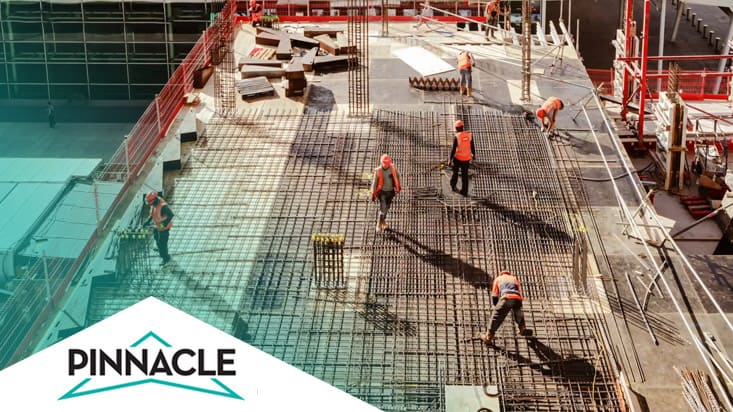A performance bond for a construction project (also known as a contract bond) effectively guarantees the successful and timely completion of the project by the contractor.
Call: (844) 612-7238 to get started
The bond works to protect the insured party if the contracted entity fails to fulfil its obligations as established in the contract between the insured party and the contractor.
More often than not, the investor or owner will ask for a performance bond to ensure that the value of the work is not lost if anything unforeseen happens.
How does a construction performance bond work?
A company often insists on a performance bond or a contract bond to protect itself against a contractor going bankrupt or insolvent before they complete the job, which is when the bond kicks in.
However, the activation of the performance bond may also occur if the contractor is unable to comply with the agreed construction specification, and compensation is required for any loss arising as a result.
A performance bond may be either ‘conditional’ or ‘on-demand’.
With on-demand bonds, the amount of money laid out in the contract bond can be
accessed immediately on demand in writing without having to fulfil any prerequisites whatsoever (including the establishment of the liability of the contractor) unless the demand is fraudulent.
With conditional bonds, the client must provide evidence that the contractor has failed to perform their obligations that the contract sets out and that losses have been experienced as a result.
What is the cost of performance bonds in construction?
There is no standard answer for this, as the cost of obtaining a performance bond depends on the specific requirements for the job. As a rule of thumb, a performance bond will be equivalent to 1% of the value of the project. It is not unusual for the cost of the performance bond to increase up to 2% when the project value exceeds £1 million.

Of course, there are other factors that can determine the cost of the performance bond, for example, if the project is particularly important or time-sensitive or the financial history and background of the contractor. This can increase the costs and impact on whether a surety provider will even offer them a bond. It is vital that contractors do their research and due diligence to ensure they get the lowest price that is available to them. However, do not be filled into a false economy, as while having the price is important, it is also necessary to have a comprehensive and sufficient enough bond from a reputable provider such as Pinnacle Surety. No one wants to be caught out by cutting corners.
It is also essential that a contractor makes sure that the construction bonds that they hold provide adequate coverage. If the suggested bond is not deemed to be high enough, it will be completely disregarded by the principal.
What are the advantages of a construction performance bond?
The ability to offer a performance bond or guarantee can be essential when a contractor is bidding for contractors. Not being able to do this may exclude a contractor from the bidding and tendering process.
A contractor bond allows both the principal and the contractor to enter into contracts with peace of mind, as there is a surety to ensure that there is satisfactory completion of a project as per agreed terms. It is also a good, authentic alternative to letters of credit and bank bonds and enhances the liquidity of the contractor. It also helps to alleviate the pressure on borrowing from the bank and allows the contractors to respond to more tenders.
What are the disadvantages of a construction performance bond?
 As with anything, there are some disadvantages to construction performance bonds. To begin with, the contract must have plenty of detail so that it is clear as to whether the contractor has fulfilled their duties under the terms.
As with anything, there are some disadvantages to construction performance bonds. To begin with, the contract must have plenty of detail so that it is clear as to whether the contractor has fulfilled their duties under the terms.
In some cases, the provider of the bond may claim that the contract has been fulfilled, even if the principal disagrees with it. On top of this, the principal may have to spend time quantifying and listing the losses that they have suffered as a result of the work not being completed to the required standard or on time.
As well as that, the terms of the bond may mean that the principal has to take a particular course of action to ensure that the project is completed sufficiently, and in many cases, this is the cheapest and not necessarily the best option for them.
Contractors often find the process of finding a suitable performance bond time consuming and dull, and not always the best use of their time. After all, they will need to provide a range of documentation to the surety provider as well as have credit checks run against their names and business. When trying to negotiate with principals, this can take away valuable time and resources.
How can contractors find the best construction performance bond?
Here at Pinnacle Surety, we have 25 years of experience in providing contractors and construction companies with bonds. We do not offer a one size fits all service; instead, we recognize that every single client has individual needs and requirements, so we work with contractors to make sure our service is tailored to exactly what they need.
We also understand that time equals money, and we do what we can to make the process of arranging a construction performance bond as simple and as efficiently as possible. We ask for only the necessary documentation before doing all of the hard work for our clients, so they can be out there, earning money and building their reputation as soon as possible. It also means that both contractors and their clients can rest assured that they are fully covered and that everyone is working in line with the most current regulations and guidelines.
Get in touch with us today to find out more about the services that we offer and how we can help you and your clients.


